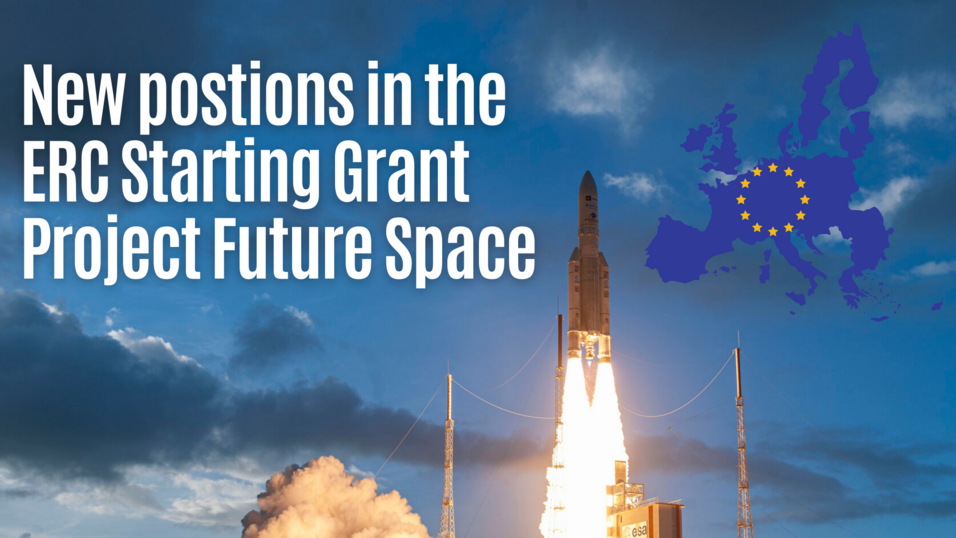Deadline for Applications: June 15, 2023. Starting date: ideally November 1st, 2023; a later start is possible.
FutureSpace! Making the Ariane Rocket: Negotiating relations between European integration and the future of Europe in space
(PI: Dr. Nina Klimburg-Witjes)
FutureSpace explores the intricate relations between large-scale infrastructures, practices of European integration, and envisioned space futures, using the case of the European Ariane rocket. The project will provide empirically and theoretically rich insights into how the future of European integration in space is imagined and enacted in the global space race. Methodologically, the project team will conduct an interdisciplinary and multi-sited ethnography that links social science and engineering to understand better this unique space infrastructure's material and imaginative aspects. Over five years, we will “follow the rocket around” across Europe to understand how it is imagined and enacted by different actors over time and to trace the co-productive relationship between practices of European integration, changing geopolitical power relations, and envisioned futures of space.
We will draw on and contribute to the lively debates in STS, Social Studies of Outer Space, international relations, and anthropology of outer space about, among others, the politics of infrastructuring; space as a place; sociotechnical imaginaries, commercialization and militarization of space, sustainability, governance, and values in the New Space age, and methodological innovations in studying the relations of Earth and outer space.
Qualifications Post-Doc Candidate
We are looking for a colleague who
- Holds a completed PhD (or is about to complete in the next months), preferably in STS or a related social science field (e.g., anthropology, sociology, political science)
- Is familiar with central approaches, theories, and current debates in STS and at least one of the following fields of study: anthropology, Social Studies of Outer Space, (critical) innovation, or European studies, ideally focusing on questions of outer space
- Has proven experience in autonomously conducting ethnographic research and is willing to spend longer periods (2-3 weeks or longer if desired) conducting fieldwork for the project in France, Germany, Italy
- Has excellent organization and time-management skills
- Has proven experience with publishing in international peer-reviewed journals
- Has an excellent command of English in both speaking & writing; is willing to (co-)author and contribute to project-related publications in English
Main tasks
- To organize, plan and conduct ethnographic fieldwork in the context of the FutureSpace project in at least two of the case study countries (Germany, Italy, France)
- To contribute to collaborative ethnographic research that involves international policy settings, space policy conferences, and space industry settings
- To develop – in close collaboration with the project team – a set of innovative research methods and collaborative working practices that may be necessary to achieve the objectives of the research
- To write and/or contribute to single and co-authored publications in English in leading peer-reviewed international journals
Qualifications PhD Candidate
We are looking for a colleague who
- Has a completed university degree (Master's or equivalent), preferably in STS or a related field of social or cultural sciences (e.g., anthropology, sociology, political science)
- Excellent command of English in both speaking and writing; willingness to contribute to project-related publications in English
- Ability to work both independently and team-oriented, with good time management
- Is willing to spend longer periods (2-3 weeks or longer if desired) conducting fieldwork for the project in France, Germany, and/or Italy
- First publishing experiences are a plus
Main Tasks
Your main task is to develop and implement a PhD-project within the conceptual and thematic framework of the ERC-funded project FUTURESPACE. In addition, you are expected to
- organize, plan, and conduct ethnographic fieldwork in the context of the project
- actively contribute to the planning, organization, and implementation of workshops, conferences, working meetings of the international scientific advisory board, and other events in the context of the FUTURESPACE project
What we offer
The Department of Science and Technology Studies is part of the Faculty of Social Sciences at the University of Vienna and has a long-established reputation as one of the most distinguished institutions in Europe. Multiple research foci at the STS department connect in fruitful ways to the themes of this project (e.g., “Infrastructures, Technologies & Materiality", "Governance, Citizenship & Participation”) and provide the team with valuable opportunities for intellectual exchange.
- Candidates will be able to work on cutting-edge research topics and get access to an international network of high expertise, work in collaborative team research setting with sufficient freedom to develop their own research and teaching career
- For PhD candidates: Opportunity to participate in the annual PhD summer school of the STS Department and discuss ongoing work with peers and invited international scholars, as well as in the Vienna Doctoral School of Social Sciences
- You are not required to teach, but teaching is possible if desired (for PhD candidates only after the first two years)
- For information about salaries, please see the Salary schemes for University Staff according to the Collective Bargaining Agreement https://personalwesen.univie.ac.at/en/jobs-recruiting/job-center/salary-scheme/
If you want to join our team, please submit the following documents in one PDF file to nina.witjes@univie.ac.at by June 15, 2023.
- A motivation letter (max two pages) in which you outline (1) why you are interested in contributing to the Future Space project, (2) what kind of expertise and skills you want to contribute to the project; (3) what will be the aspects of European integration practices and their impact on envisioned space futures (and vice versa) you would like to focus on in the context of the FUTURESPACE project
- A detailed CV including a publication and teaching record (if applicable)
- Copies of any relevant certificates (in particular university degrees)
- A writing sample like a book chapter or journal article (postdoc) or MA thesis (PhD candidate)
- Contact details of two referees

